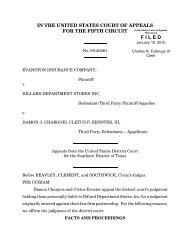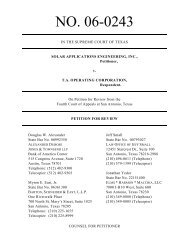Laughlin v. Nouveau Body & Tan - The Appellate Record
Laughlin v. Nouveau Body & Tan - The Appellate Record
Laughlin v. Nouveau Body & Tan - The Appellate Record
You also want an ePaper? Increase the reach of your titles
YUMPU automatically turns print PDFs into web optimized ePapers that Google loves.
Case: 09-10622 Document: 00511064454 Page: 16 Date Filed: 03/29/2010No. 09-10622renounced them in whole or in part to the prejudice of his creditor’srights. In such a case, the renunciation may be annulled in favor ofthe creditor to the extent of his claim against the successor, but itremains effective against the successor.LA. CIV. CODE ANN. art. 967. <strong>The</strong> Louisiana Supreme Court has interpreted thisarticle as requiring “a creditor [to] prove that an heir renounced his inheritancefraudulently or with an intent to wrongfully deprive the creditor of his claim onthe debtor’s property in order for the creditor to have a right to have therenunciation annulled and to accept the inheritance in the heir’s stead.”Succession of Neuhauser, 579 So. 2d 437, 441 (La. 1991). 12We determine that, for the purposes of our inquiry today, Louisiana lawis indistinguishable from the Texas law at issue in Simpson, and we hold that,under Louisiana law, a valid pre-petition renunciation of an inheritance interestis not a transfer of the debtor’s property under § 727(a)(2). Section 727(a)(2)denies a discharge to a debtor who has “transferred . . . property of the debtor,within one year before the date of the filing of the petition,” 11 U.S.C.§ 727(a)(2)(A) (emphasis added); Pratt, 411 F.3d at 565 (requiring that propertyof the debtor be transferred). <strong>The</strong> question then is whether article 967recognizes or creates rights in the renounced inheritance that disturb therelation-back fiction. Absent such rights, the relation-back fiction controls andthe renouncing debtor is deemed never to have had rights in the renouncedinheritance. See LA. CIV. CODE ANN. art. 954.12Neuhauser dealt with differently numbered and worded civil code sections. In 2000,the relevant civil code provisions were “simplified”; but there is no suggestion—either by caselaw, commentators, or the parties here—that the “simplifications” abrogated Neuhauser’sholdings. See LA. CIV. CODE ANN. art. 967 revision comment (“This Article clarifies the priorrules and uses simpler terminology. As in prior law, judicial authorization for an acceptanceby a creditor in the name of a successor is required, and that principle is set forth in theArticle.”); LORIO, 10 LA. CIV. L. TREATISE § 6:8 (noting that nothing substantively changed withthe revisions and renumbering of article 967).16




